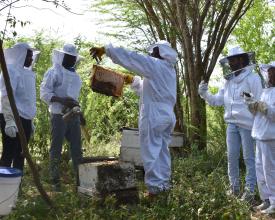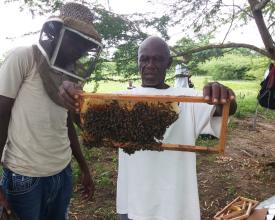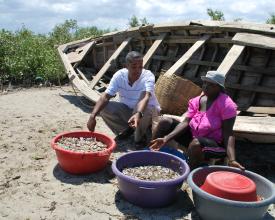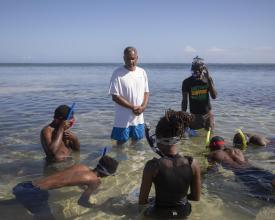
Strengthening of Coastal Zone Management Initiatives for the 3-Bays Marine Managed Area, Haiti
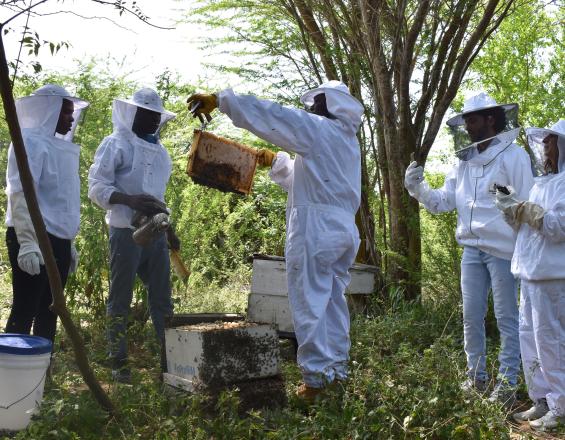
The primary risks to the 3-Bays Protected Area (3BPA) sustainable fisheries and biodiversity protection include poor governance, lack of environmental awareness, and unsustainable fishing practices. Therefore, FoProBiM (Fondation pour la Protection de la Biodiversité Marine) has been working with local communities to find a balance between conservation and the use of the natural resources in the area, by promoting alternative livelihoods coupled with environmental education on good governance and business training. As a result, the project benefits local communities by safeguarding priceless biodiversity, replenishing depleted fish stocks, raising environmental awareness among fishermen, and other stakeholder groups.
Contexto
Défis à relever
The most significant threats for resource management in the 3-Bays is overfishing and mangrove deforestation for charcoal production and firewood.
The overfishing problem is a microcosm of what is happening throughout Haiti, where high levels of poverty and unemployment have caused many persons to turn to fishing to survive.
Mangrove deforestation is occuring in 3-Bays despite the fact that they are officially protected. It often occurs as a substitute when fishing is poor, which can negatively impact many fish species that utilize mangroves during a portion of their life cycle.
Unless significant changes are made to the current fisheries management regime, especially with regard to the overall fishing effort, the development of alternate income sources and the enforcement of mangrove protection regulations, combined with education and outreach programs; the ongoing biodiversity loss and habitat degradation will continue.
Ubicación
Procesar
Summary of the process
The strategy of combining environmental education and outreach with the development of sustainable alternative livelihoods directly addresses the two main threats for resource management in the 3-Bays. New ways of income generation will reduce fishing pressure, which will provide an opportunity for the fish stock to increase. Additionally, if stakeholders are environmentally educated and aware, they will understand the importance of sustainable resource use and should be more engaged to participate in the management and governance of the protected area.
Building Blocks
Environmental Education and Outreach
An important component of conserving the marine protected area is public education, communication, and increasing awareness about the value and vulnerability of the marine ecosystem. Capacity building activities were desperately needed and the project provided this opportunity to stakeholders including university students, local government officials, and FoProBiM employees. Everyone was glad to go outside and have real field experiences, which made the classes, both in the classroom and, in particular, the field, extremely well accepted. This was the first "large scale" activity that FoProBiM offered to many sectors, allowing them to meet each other, learn together and create new beneficial contacts. FoProBiM has conducted smaller, more directed activities similar to this in the past. As management operations for the 3-Bays continue to grow, this additional capacity will be crucial for all stakeholder groups.
Enabling factors
- Outreach activities should be integrated into a program
- Training for trainers; train community members to conduct activities
- Stakeholder engagement
Lesson learned
- The addition of university students is key.
- Activities carried out within the communities are more effective
Sustainable alternative livelihood
In order to manage parks sustainably, access to traditional resources is frequently restricted or changed. Such impacts must be reduced since local residents and resource users must directly or indirectly benefit from the MPA and be fully included in the solution. To steer local stakeholders away from the ongoing overexploitation of their mangrove and fishery resources, the development of environmentally friendly and sustainable alternative revenue creation was created. Apiculture was chosen to demonstrate that income can be generated from mangroves and other plants without destroying them and losing their ecological benefits. This activity has strengthened the two fishing associations and illustrated that they can cooperate to execute activities outside of their "normal" operations, the members stand to gain from it.
Enabling factors
- Strengthening the existing beekeeping cooperative
- Training beneficiaries in honey harvesting techniques and business management
Lesson learned
- Women (fishermen's wives) were more engaged than the actual fishermen who were busy spending long hours in the sea.
Impacts
The goal was to improve the management and conservation of coastal and marine ecosystems within the 3-Bays, by providing educational and training activities and best practices linked to concrete actions in order to increase local environmental and economic resilience and reduce vulnerabilities within local communities.The project’s impacts were:
-
Local communities within the MPA are empowered to contribute to the monitoring/patrolling activities, which will reduce the illegal activities in the MPA. The participants were required to take part in motoring/patrolling activities at least four times a month at first, both on land and at sea. However, due to the illegality of mangrove deforestation and other forms of fishing, participants strengthened their collaboration with the local national police in order to report violations; at this time, there have been no arrests or detentions made by participants.
-
To steer local communities away from the ongoing overexploitation of the mangrove and fishery resources, the development of apiculture, as an environmental friendly and sustainable alternative revenue was considered a viable option. This demonstrated that money can still be made from the mangrove ecosystem without destroying it. Furthermore, this activity has strengthened the two fishing associations illustrating that they can cooperate to conduct activities outside of their "normal" actions.
Beneficiaries
· National Agency for Protected Area (Government)
· University of Limonade, near 3-Bays.
· Local fishermen and female traders
